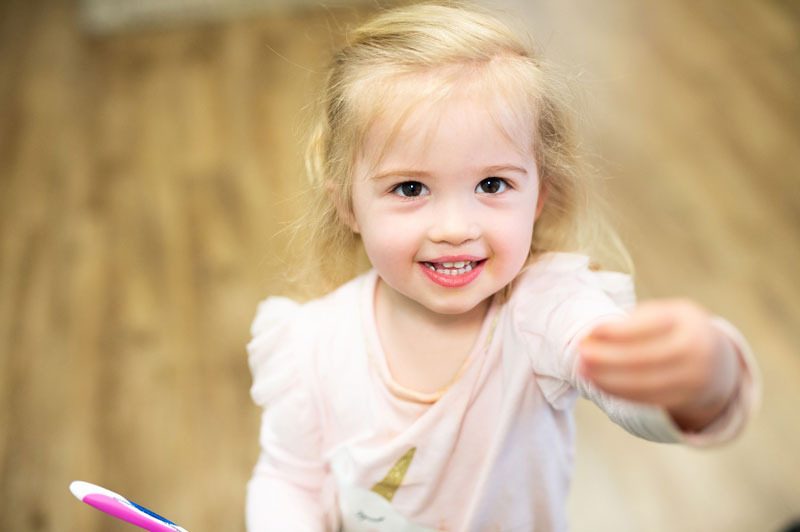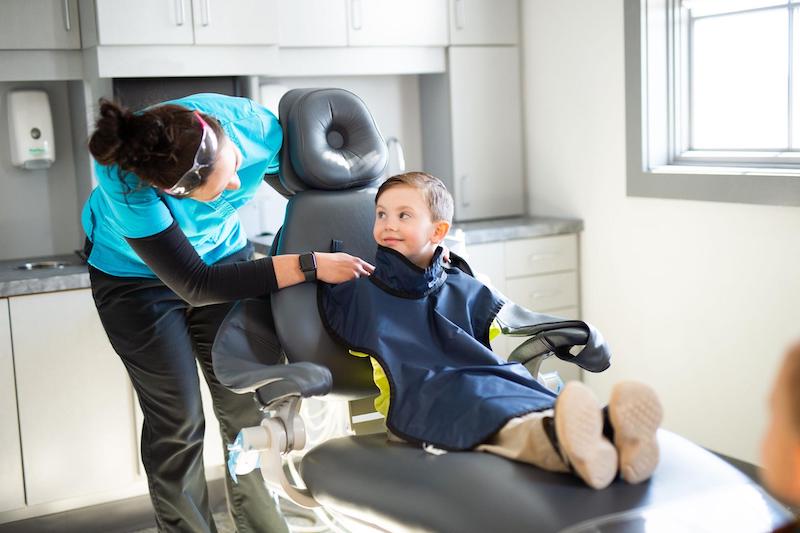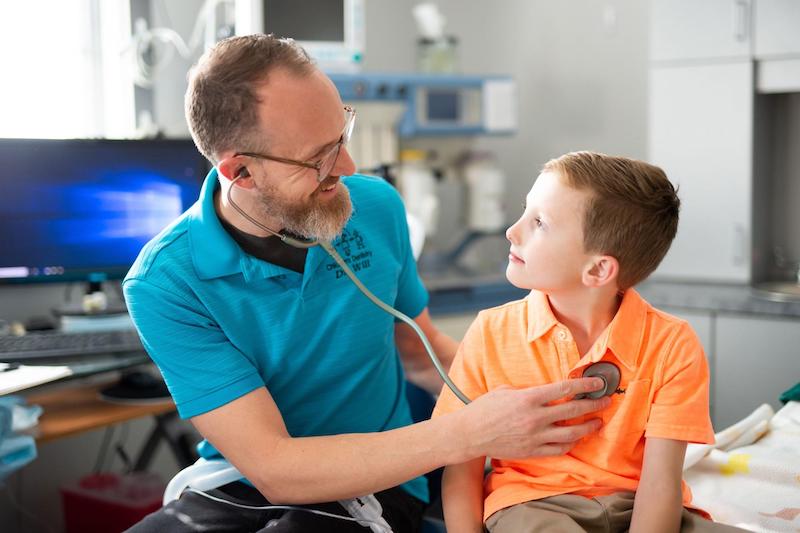Development of Your Child’s Teeth

Questions about how your child’s teeth are developing or need to book an appointment? Contact us today online or by calling (434) 817-1817.
Children’s Tooth Development
The development of your child’s teeth is one of the most crucial parts of their health as they continue to grow into adults. Make sure you understand how they develop, and what you can do to help ensure they stay on track for a healthy smile.
Below, you’ll find information about what you can expect as your child’s teeth develop.
Do you believe something is going wrong with the development of your child’s teeth?
If your child is experiencing unexpected discomfort or you believe that there is a hiccup in the development of your child’s teeth, please do not hesitate to call our office at (434) 817-1817. We’ll schedule them for an appointment and make sure everything is coming in right. If not, we’ll work with you to ensure they’re on track for a lifetime of smiles.

Baby and Primary Teeth Development
Baby teeth, otherwise known as primary teeth, are the first 20 teeth children grow as infants and toddlers.
Baby teeth are important for the development of your child’s mouth, general health, and overall development. They are functionally important for:
- Chewing food
- Developing speech
- Determining where the permanent teeth will eventually erupt
When Will My Baby’s Teeth Start Growing?
Primary teeth are actually developing beneath your child’s gums at birth, and will erupt into position from when they are 4 to 6 months old until they are about 2 years old. Occasionally, teeth can even be present at birth.
While some children’s teeth will erupt on this schedule, the eruption process varies among all children. Sometimes children will not start to show their primary teeth until they are up to 1-year old.
Don’t panic if your child’s teeth don’t show until a little later. We will examine your child’s tooth development process during their routine dental check-ups and let you know if there is anything that is out of the ordinary.
Baby Tooth Dentition
Below, you’ll find when you can expect your child’s baby teeth to erupt.
| Tooth | Approx. Age at Eruption |
|---|---|
| Mandibular (lower jaw) Incisors | 6-7 months |
| Maxillary (upper jaw) Incisors | 7-9 months |
| Mandibular First Molars | 12 months |
| Maxillary First Molars | 14 months |
| Mandibular Canines | 16 months |
| Maxillary Canines | 18 months |
| Mandibular Second Molars | 20 months |
| Maxillary Second Molars | 24 months |
How to Care For Primary Teeth
Baby teeth are naturally extremely white. Yellow or brown discoloration along with bright white spots are often indicators of cavities or other dental conditions. If you notice this, contact us immediately.
Keeping primary teeth in place until they are all lost naturally is incredibly important to ensure proper growth and development of your child’s permanent teeth. Routine dental care will maintain your child’s primary teeth until they are ready to fall out naturally, which will make way for their adult teeth.

Permanent Tooth Development and Eruption
Once your child is 6 years old, their primary incisors, or front teeth, will begin to loosen and exfoliate. As this happens, both their permanent incisors and permanent molars will begin to erupt. The incisors normally erupt between the ages of 6 and 8.
Most children will not lose any more teeth until they are 9 or 10 years old, when primary molars begin exfoliating and are replaced by the permanent premolars. The canines, or “eye teeth”, usually erupt around 11 or 12 years of age.
Permanent Dentition
Below, you’ll find when you can expect your child’s adult teeth to erupt.
| Tooth | Approx. Age at Eruption |
|---|---|
| Mandibular (lower jaw) Incisors | 6-8 years |
| Maxillary (upper jaw) Incisors | 7-9 years |
| Mandibular First Molars | 6-7 years |
| Maxillary First Molars | 6-7 years |
| Mandibular Canines | 9-10 years |
| Maxillary Canines | 11-12 years |
| Mandibular First Premolars | 10-12 years |
| Maxillary First Premolars | 10-11 years |
| Mandibular Second Premolars | 11-12 years |
| Maxillary Second Premolars | 10-12 years |
| Mandibular Second Molars | 11-13 years |
| Maxillary Second Molars | 12-13 years |
| Mandibular Third Molars | unpredictable |
| Maxillary Third Molars | unpredictable |
Wisdom Teeth
The final stage in the development of your child’s teeth are their wisdom teeth, otherwise known as their third molars. This can happen as early as age 14 or 15 with some patients, though many people will not experience this stage until they’re into their twenties. It is not uncommon for these teeth to be missing or positioned in such a way that they are unable to naturally erupt into position.
When these teeth are in a position that may cause damage to the adjacent teeth, or become a site for infection to develop, they need to be extracted. We’ll monitor the growth of these teeth closely to ensure your child’s mouth develops as it should.

Commonly Asked Questions
What can I do to help my child’s tooth development?
There are 2 main things you can do to help along their development:
- Oral hygiene: The oral hygiene of your child during the development of their teeth will help set the course for the future of their smile. This is particularly true when both primary and permanent teeth coexist in your child’s mouth. Make sure you child brushes twice a day for 2 minutes each, as well as flosses.
- Regular dental appointments: Routine care will catch any development issues for the permanent teeth, such as insufficient space for them to erupt into their correct position — leaving them crooked or out of line. We’ll monitor this closely and recommend orthodontic treatment if it’s appropriate for your child.
Is it normal for adult teeth to appear before baby teeth fall out?
This is completely normal! You’ll notice that adult teeth will appear darker when viewed next to primary teeth. Don’t worry if you are noticing this with your child — it’s all part of a healthy set of teeth.
Should a baby tooth be fixed if it is damaged or decayed?
If your child’s tooth is damaged, knocked loose prematurely, or if they are experiencing a cavity, they should always visit the dentist as soon as possible. While primary teeth will eventually fall out, they are there for a reason and an integral part of your child’s tooth development.
How often do children need a dental exam?
Children should always receive two dental exams a year. For some patients, additional exams could be helpful for more extensive dental treatment.
What should I look for between dental exams?
Most issues will generally be caught with two yearly dental exams. Still, you should look out for some things in-between appointments. These include:
- Temperature sensitivity in the teeth
- Gums that are swollen or bleeding
- Damage to fillings, crowns, or other dental restorations
- Mouth pain, including teeth, tongue, or jaw pain
- Difficulty while chewing or swallowing
- Continuous bad breath even with brushing and flossing
If your child is experiencing any of these, contact us to see if you should schedule an additional exam
Are you a dentist who works with special needs children?
Of course! Generally, we can perform basic dental exams for children with special needs. Our whole team has experience working with children with special needs, including those with Down Syndrome, Cerebral Palsy, Autism, and dental anxiety.
We’re committed to making sure your child gets the care they need and deserve.
Question or concerns about your child’s tooth development?
We’re here to answer your questions and put you at ease. Please call (434) 817-1817 or contact us online.


